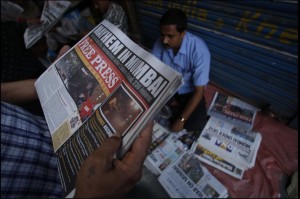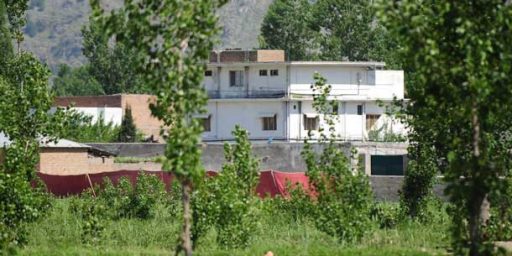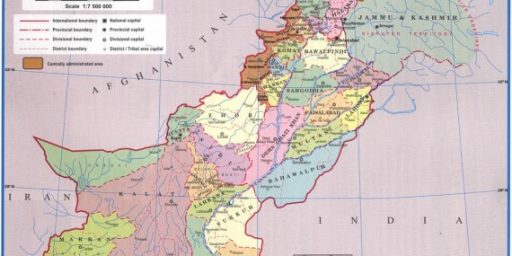What the Heck Happened in Mumbai? (Updated)
The Washington Post is now reporting that the Indian Army is conducting raids in an attempt to free the hostages that have been taken in the attack that took place in Mumbai yesterday:
Sharpshooters and Indian Army commandos launched dramatic raids Thursday into two of India’s most luxurious hotels, attempting to root out gunmen whose deadly attacks have transformed parts of India’s commercial capital into smoldering war zones.
Hundreds of families grieved for the 125 people reported killed, as police and terrorism experts remained puzzled over who was behind the attacks on the hotels, a Jewish center, and other sites in the heart of Mumbai. More than 325 people were reported injured.
The reports of casualties have been quite varied but seem to be rising as a more complete account of the events emerges.
There’s also been quite a bit of thought-provoking commentary on the attacks.
Shlok Vaidya, an energy security analyst with the Center for Terrorism Research at the Foundation for the Defense of Democracies, has made some very interesting speculations. Start at the earliest post for 11/26/2008 and scroll up. He seems to think that the attacks were the work of single group and that they were darned lucky. There’s plenty to chew on in his several, unexcerptable posts.
Richard Fernandez has a transcript of Shlok’s Twitter page which is also intriguing.
Walid Phares at Counterterrorism Blog has a quick take to the effect that urban jihad has come to India while Roderick Jones at CT notes the importance of Twitter in getting information on the attacks out.
Joe Gandelman, too notes the importance of Twitter. He’s got transcripts of several feeds along with multiple media links to coverage of the attacks. Holly Robinson has followed up with more media links while Swaraaj Chauhan comments in multiple posts, the most recent of which is here.
Cernig at Newshoggers is quick to throw cold water on the idea that the attacks were the work of Al Qaeda:
I’ll admit that was my first reaction too, and it’s still possible – there are even unconfirmed reports that at least some of the attackers may be Pakistani nationals. I wrote in an emal discussion with my Newshoggers colleagues that the recent Pakistani government’s charm offensive, making nice with India and announcing curbs on the ISI, was to be distrusted and that I suspected it was more window-dressing than actuality. However, as one analyst told me today “far right Indian politicians and the security apparatus have a lot to gain from claiming that the attacks were from Pakistan and the ISI, and they have a lot to lose economically and in international standing if it turns out it was a domestic attack motivated by religiously charged politics.” Moreover, these attacks don’t fit the classic pattern for either AQ or the LeK…
Pundita is critical of the official (or semi-official) U. S. responses from the Bush Administration and President-Elect Obama:
India has suffered many terrorist attacks but there is no precedent for such an act of war against civilians in a modern democracy. For several hours, the attackers virtually took command of a major world city. While the death rate from the attacks seems to be holding at this point to around 100 with estimates of wounded at around 1,000 not even the 9/11 attacks, not even Beslan, reflect such an onslaught against modern civilization.
So, the Thanksgiving holiday in the USA is no excuse. President George Bush should have made a direct statement from Camp David, and President-elect Barack Obama should have done the same from Chicago. Instead, they followed the approach of United Nations Secretary Ban Ki-moon, who issued his criticism through a spokesperson.
The three statements condemning the terrorism are generic and while Bush and Obama offer help to India on behalf of the United States, the full statements from other national leaders also offer help. Such offers need to be accompanied by a recognition of the magnitude of the situation; statements from leaders such as Taro Aso reflect this need, whereas those from Bush and Obama do not.
She contrasts the U. S. statements unfavorably with those of Russia and the United Kingdom.
If you’ve got any other interesting analysis, please put the links in the comments and I’ll update the post.
UPDATE
A “smart friend” of Ezra Klein’s points a tentative finger at Pakistan’s ISI:
Pakistan generally tends to provoke strife in India when things are going badly internally, under the (I think flawed) assumption that keeping India distracted with internal problems will make Pakistan safer. Oy. Worth noting that in all of 2007, under Musharraf’s rule in Pakistan, there were two major attacks in India. In 2008, under the new civilian rule, there have now been eleven. Whether that’s because the civilian government (1) doesn’t have control over the elements of Pakistan that foment these activities and they’re freelancing or (2) is directing more attacks than Musharraf did, is also an open question.
Either way, if — and this is a big if — India decides/discovers that Pakistani intelligence was involved in the attacks, the risk of outright war between the two will not be insubstantial. Similar attacks occurred against the Indian Parliament in December 2001, and when those attacks proved to be linked to the ISI, India quickly went to full combat readiness and had their largest military mobilization in 30 years.
The Pakistan Policy Blog says “Not so fast”:
In blaming Pakistan, Indian officials are masking their own incompetence. India’s security establishment has, much like Pakistan’s, failed to protect its citizenry. States are reluctant to acknowledge that non-state threats are purely that; it is humiliating.
The 800 pound gorilla in the room is the rising threat of homegrown Muslim militancy in India. Muslims are an underclass in India and increasingly plagued by a Hindu chauvinism that has come from the periphery to India’s center. Yesterday’s events are the natural outgrowth of Hindu fascism, which belies the spirit of Hinduism in burning Muslims alive and raping Christian nuns.
India must confront its inner demons. But it is clearly proving resistant to do so, given that elections are not too far.
Terrorism is politics of the most morally decrepit sort. It can involve religion, but only by removing its ethical constraints. It is also imprecise. As I write, a family friend and his father — both Muslim — are holed up in the Taj, uncertain of their fate.
I would point out that the two main competing theories — a domestic group and outside involvement — are not mutually exclusive. Extremist groups have been known to share logistical networks (for safehouses, weapons procurement, etc.), and there aren’t always bright lines between them. So, it could be that domestic perpetrators of the attack conceived and executed the idea, but operatives turned to Lashkar-e-Taiba or some other group for logistical help and expertise.
Courtesy of PoliGazette there’s an analysis of the attack from Stratfor.com, the gist of which is that whatever the facts Indian officials will be motivated to blame the attacks on Pakistan. This may foment a showdown between the two countries analogous to that in 2002 which as then the U. S. may be in a position to benefit from. This is not a sort of brinksmanship that appeals to me.






AQ or not it always and invariably settles on Radical Islam.
Do you suppose there’s any chance of our government admitting this salient point?
While Pundita makes a compelling point about the unique nature of this attack, she grossly overstates when she claims that the attackers were “in virtual command” of Mumbai. Furthermore, this passage —
— demonstrates how overheated and irrational her commentary is.
Every successful terrorist attack will be different from what preceded it, or it will not be successful. That doesn’t make such a success “unprecedented” in the absolute value of its significance. And while the death toll is horrible, with all due respect you can roll 100 into 3,000 quite a few times before you begin to understand the word “onslaught.”
Given this wild lack of perspective, her criticisms of President Bush and President-Elect Obama sound ridiculous. No one in India is gauging reaction on a by-the-word level like this, and while “world leaders” are experienced at big words, everyone on the planet knows what country has sacrificed blood, gold and, yes, prestige to fight the good fight when it has been necessary to do so. Being compared unfavorably to the potentate-for-life of Russia and the milquetoast bureaucrats of the world’s other enablers of and apologists for terrorism, the Europeans, is hardly an insult in this context.